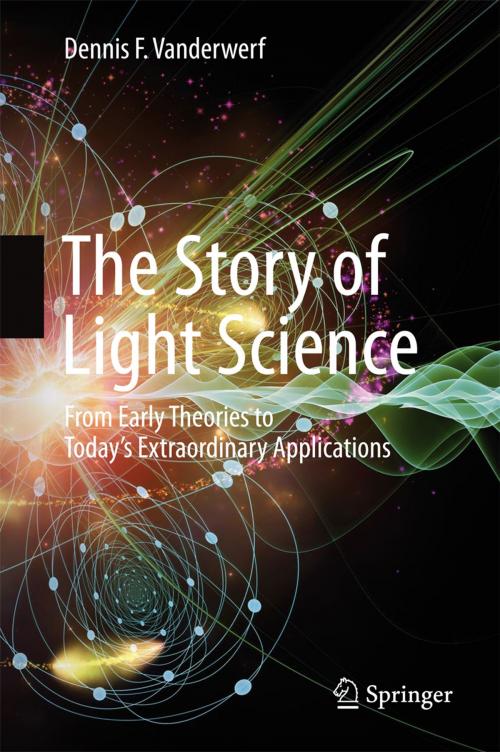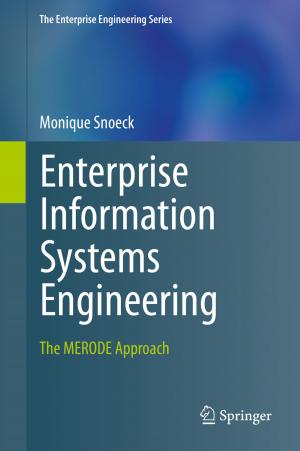The Story of Light Science
From Early Theories to Today's Extraordinary Applications
Nonfiction, Science & Nature, Technology, Lasers, Computers, Advanced Computing, Information Technology| Author: | Dennis F. Vanderwerf | ISBN: | 9783319643168 |
| Publisher: | Springer International Publishing | Publication: | August 6, 2017 |
| Imprint: | Springer | Language: | English |
| Author: | Dennis F. Vanderwerf |
| ISBN: | 9783319643168 |
| Publisher: | Springer International Publishing |
| Publication: | August 6, 2017 |
| Imprint: | Springer |
| Language: | English |
This book traces the evolution of our understanding and utilization of light from classical antiquity and the early thoughts of Pythagoras to the present time.
From the earliest recorded theories and experiments to the latest applications in photonic communication and computation, the ways in which light has been put to use are numerous and astounding. Indeed, some of the latest advances in light science are in fields that until recently belonged to the realm of science fiction.
The author, writing for an audience of both students and other scientifically interested readers, describes fundamental investigations of the nature of light and ongoing methods to measure its speed as well as the emergence of the wave theory of light and the complementary photon theory. The importance of light in the theory of relativity is discussed as is the development of electrically-driven light sources and lasers. The information here covers the range o
f weak single-photon light sources to super-high power lasers and synchrotron light sources.
Many cutting-edge topics are also introduced, including entanglement-based quantum communication through optical fibers and free space, quantum teleportation, and quantum computing. The nature and use of "squeezed light" - e.g. for gravitational wave detection - is another fascinating excursion, as is the topic of fabricated metamaterials, as used to create invisibility cloaks. Here the reader also learns about the realization of extremely slow speed and time-reversed light.
The theories, experiments, and applications described in this book are, whenever possible, derived from original references. The many annotated drawings and level of detail make clear the goals, procedures, and conclusions of the original investigators. Where they are required, all specialist terms and mathematical symbols are defined and explained.
The final part of the book covers light expe
riments in the free space of the cosmos, and also speculates about scenarios for the cosmological origins of light and the expected fate of the photon in a dying universe.
This book traces the evolution of our understanding and utilization of light from classical antiquity and the early thoughts of Pythagoras to the present time.
From the earliest recorded theories and experiments to the latest applications in photonic communication and computation, the ways in which light has been put to use are numerous and astounding. Indeed, some of the latest advances in light science are in fields that until recently belonged to the realm of science fiction.
The author, writing for an audience of both students and other scientifically interested readers, describes fundamental investigations of the nature of light and ongoing methods to measure its speed as well as the emergence of the wave theory of light and the complementary photon theory. The importance of light in the theory of relativity is discussed as is the development of electrically-driven light sources and lasers. The information here covers the range o
f weak single-photon light sources to super-high power lasers and synchrotron light sources.
Many cutting-edge topics are also introduced, including entanglement-based quantum communication through optical fibers and free space, quantum teleportation, and quantum computing. The nature and use of "squeezed light" - e.g. for gravitational wave detection - is another fascinating excursion, as is the topic of fabricated metamaterials, as used to create invisibility cloaks. Here the reader also learns about the realization of extremely slow speed and time-reversed light.
The theories, experiments, and applications described in this book are, whenever possible, derived from original references. The many annotated drawings and level of detail make clear the goals, procedures, and conclusions of the original investigators. Where they are required, all specialist terms and mathematical symbols are defined and explained.
The final part of the book covers light expe
riments in the free space of the cosmos, and also speculates about scenarios for the cosmological origins of light and the expected fate of the photon in a dying universe.















